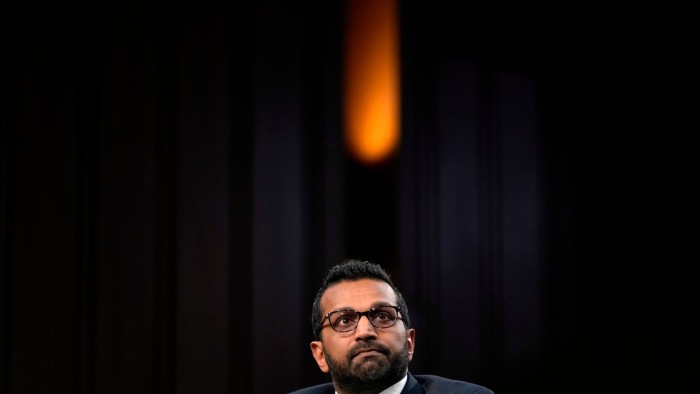Unlock the White House Watch newsletter for free
Your guide to what the 2024 US election means for Washington and the world
Kash Patel, Donald Trump’s nominee for FBI director, has come under scrutiny over his business ties, including holding stock in a group that owns Shein, the Chinese fast-fashion retailer accused of using forced labour.
Patel stated in a financial disclosure form that he held $1mn-$5mn worth of shares in Elite Depot, a Cayman Islands-group that, according to UK business records, owns Shein. The stake was the largest asset in Patel’s disclosure.
Human rights groups and US lawmakers, including Republican Marco Rubio, the former Florida senator who is now Trump’s secretary of state, have accused Shein of using forced labour in its operations in China. Shein has previously told the Financial Times it had a “zero-tolerance policy” regarding forced labour.
Patel, who briefly served as deputy to the acting director of national intelligence in the first Trump administration, no longer works for Elite Depot. But in his disclosure form, he said would retain his restricted stock. A first tranche of stock vested on February 1, two days after his Senate confirmation hearing.
“The incoming FBI Director worked for 8 months as a fashion consultant to a shadowy Cayman holding company connected to a Chinese Communist party slave labour manufacturer and he gets up to $5mn in fees . . . WTF” Chris Murphy, a Democratic senator from Connecticut, wrote on social media platform X on Friday.
Patel is one of the Trump administration’s most controversial nominees. Seen as a Trump loyalist, he has defended far-right QAnon conspiracy theories and threatened retribution against opponents of the president’s Maga movement in government and the media.
He has vowed to shut down the FBI’s Washington headquarters “on day one and reopen it the next day as a museum of the ‘deep state’,” which he has pledged to root out from US law enforcement agencies.
Patel is also a board member of Trump Media & Technology Group, which runs the president’s Truth Social platform.
While working for Elite Depot, Patel criticised Temu, a rival to Shein, in opinion pieces published in US media. In one article in the Washington Times, Patel claimed that Temu was a “much greater threat” to the US than TikTok, the popular short-form video app owned by Chinese company ByteDance.
The Senate judiciary committee on Thursday postponed a vote on whether to send Patel’s nomination to the full Senate for confirmation, following objections from Democrats.
A spokesperson for Patel said he had “gone above and beyond”, including “countless meetings with senators, disclosing and reporting all sources of income” and testifying for six hours before the judiciary panel.
“The Senate has evaluated all potential conflicts and concerns,” the spokesperson said, adding that Patel looked forward to a committee vote on Thursday and to being quickly confirmed by the Senate.
If confirmed, Patel will succeed Christopher Wray, who was a vocal critic of Beijing, which he accused of conducing widespread espionage operations. China has repeatedly denied engaging in espionage against the US.
Wray, who was appointed by Trump in 2017 and was set to serve for a decade, stepped down ahead of the president’s inauguration last month.
Shein has ploughed funds into a lobbying campaign in western capitals including Washington and London, as it has sought to fight back against a political and regulatory backlash over its environmental record and supply chain practices.
The fashion group is seeking to list in London in the coming weeks after it was rebuffed by US regulators. Rubio last year urged the UK to investigate whether Shein had used forced labour, noting its failure to meet US listing requirements “due to concerns about its unethical and irresponsible business practices”.
On Friday, Trump amended an executive order to reinstate an exemption from tariffs and expansive customs checks for shipments under $800 in value when entering the US. The reprieve will help Shein.
Shein has been challenged by Temu, a copycat platform that ships low-cost goods from China directly to US consumers. The groups have been locked in a bitter fight over suppliers in China as well as legal battles in the US.
In his financial disclosure, Patel also said that he had received income from the Epoch Times, an anti-CCP publication affiliated with Falun Gong, a dissident group.
Additional reporting by Ryan McMorrow in Beijing
Read the full article here




